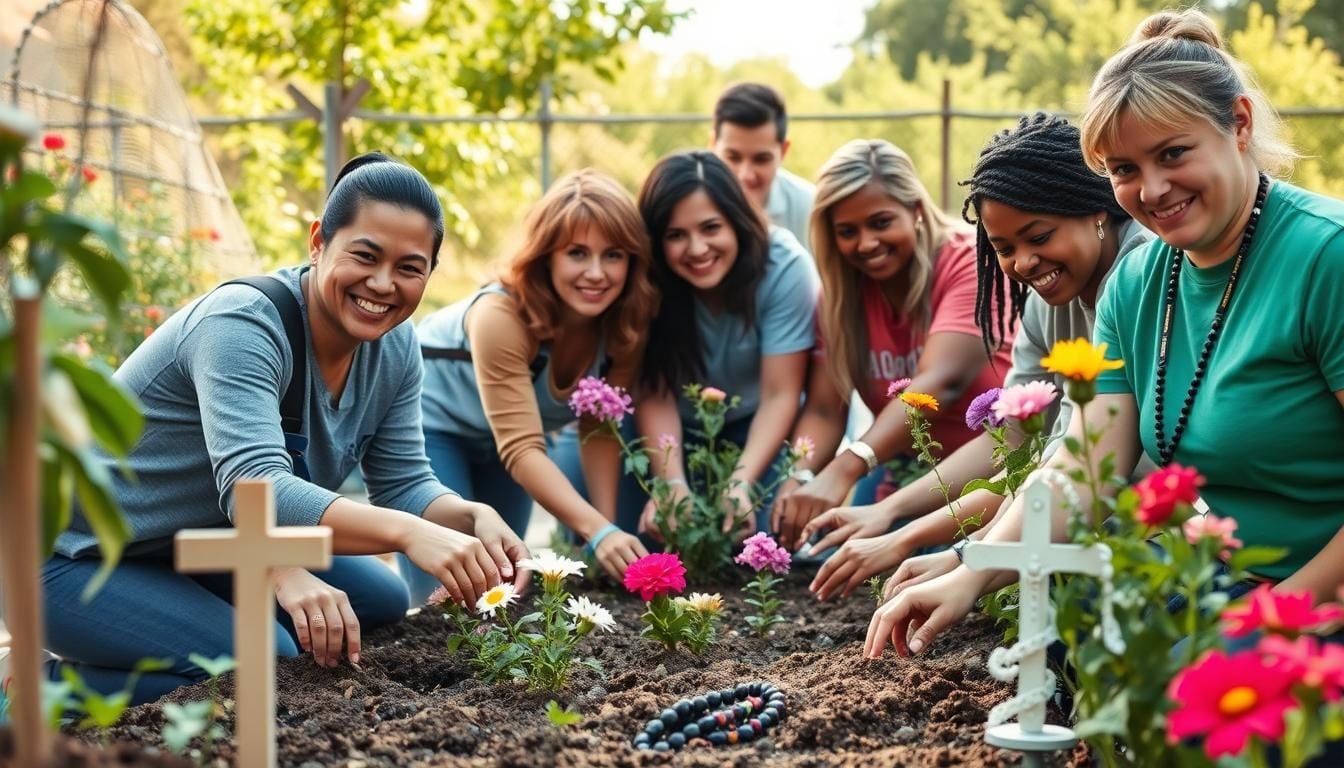Volunteering And Serving Others In The Catholic Tradition
This website contains affiliate links. As an Amazon Associate, I earn from qualifying purchases. The content on this website was created with the help of AI.
Many Catholics value traditional gender roles in marriage. This highlights the importance of understanding Catholic social teachings.
These teachings include the call to serve others and shape our faith.
Catholic social teaching stresses the importance of serving others. It encourages us to make a positive impact in our communities. There are many ways to put our faith into action.
We can join local parish outreach programs or global initiatives. Catholic Charities and Caritas Internationalis are great examples.
By offering our time, we help those in need and grow closer to God.
Let’s explore the biblical roots of service. We’ll look at practical ways to volunteer in our parishes. We’ll also discuss the spiritual benefits of Catholic volunteering.
We’ll address how to overcome barriers to serving others. Finally, we’ll examine the lasting impact of Catholic volunteer work on communities worldwide.
Key Takeaways
- Catholic social teaching emphasizes the importance of serving others
- Volunteering opportunities range from local parish programs to global initiatives
- Serving others helps us grow spiritually and strengthens our community
- Catholic volunteer work has a significant impact on both local and global communities
- Overcoming barriers to volunteering is essential for living out our faith
Understanding Catholic Social Teaching on Service
Catholic social doctrine guides our service mission. It helps us address modern challenges through biblical service. Let’s explore this doctrine and how it shapes our calling to serve.
The Biblical Foundation of Service
Scripture deeply roots Catholic service. Jesus Christ’s teachings inspire us to help those in need. The Bible offers many examples of service, from the Good Samaritan to early Christian communities.
“For I was hungry and you gave me food, I was thirsty and you gave me drink, a stranger and you welcomed me.” – Matthew 25:35
Core Principles of Catholic Social Teaching
Catholic social doctrine emphasizes several key principles that guide our service:
- Human Dignity
- Common Good
- Solidarity
- Subsidiarity
- Preferential Option for the Poor
These principles remind us to care for all people. We must especially help those who are most vulnerable in society.
The Call to Serve in Modern Times
Today, Catholic service takes many forms. It ranges from local food pantries to global outreach programs.
The U.S. Conference of Catholic Bishops encourages daily service, not just during special events.
| Service Opportunity | Impact |
|---|---|
| Food Pantry Volunteer | Provides meals to families in need |
| Shelter Support | Offers safe housing for homeless individuals |
| Youth Mentoring | Guides and supports at-risk youth |
| Environmental Cleanup | Cares for our common home |
By embracing these principles, we live out our Catholic social doctrine. We can make a real difference in our communities through these service opportunities.
Volunteering And Serving Others In The Catholic Tradition
Catholic volunteering embodies selfless service and sacrificial love. We serve others guided by charity, justice, and mercy. Our goal is to create a more just society.
In Catholicism, we honor every person’s dignity. This belief drives our Catholic charity work, focusing on those in need. The Sisters of Mercy show this through their fourth vow of service.
Catholic social teaching guides our service. It includes seven key principles like respecting life and promoting family. These shape our volunteering and inspire us to tackle global injustice.
“Do nothing out of selfish ambition or vain conceit. Rather, in humility value others above yourselves, not looking to your own interests but each of you to the interests of the others.” – Saint Paul to the Philippians
Our tradition blends prayer with action. This approach changes both the helper and the helped. It deepens our connection to God and community.
Catholics serve in many ways. From local parish programs to global outreach, we engage in selfless service.
| Principle | Application in Catholic Charity Work |
|---|---|
| Dignity of Work | Advocating for fair wages and workers’ rights |
| Option for the Poor | Prioritizing assistance to vulnerable populations |
| Care for Creation | Promoting sustainable practices in service projects |
| Solidarity | Engaging in global outreach programs |
The Spiritual Benefits of Catholic Service
Catholic service paves the way for spiritual growth and personal transformation. Giving our time to others brings us closer to God. Through service, we tangibly live out Christ’s teachings.
Growing Closer to God Through Service
Serving others embodies Christ’s love and opens our hearts to God’s presence. Studies link volunteering with increased happiness and peace.
By focusing on others, we often fulfill our own spiritual needs.
Building Community Through Volunteer Work
Community building is central to Catholic service. Volunteering creates bonds with those we serve and fellow volunteers.
This year’s Eucharistic Revival encourages family service activities related to the Eucharist.
We can use TakeThemAMeal.com to organize these efforts. Such initiatives bring our community closer together.
Developing Christian Virtues
Service offers chances to cultivate Christian virtues. Youth programs teach us patience. Serving the sick or elderly grows our compassion. Putting others’ needs first develops humility.
These virtues shape our character and align us with Christ-centered living.
“Charity is the cement which binds communities to God and persons to one another.” – St. Vincent de Paul
Service helps others and leads to profound personal growth. It transforms us, our communities, and strengthens our connection to God’s love.
Practical Ways to Serve in Your Parish
Parish service offers many chances to live out our faith. Catholic ministry provides various options for parishioners to contribute.
Let’s explore ways to engage in parish service and strengthen our community.
Ministry Opportunities
Parishes need dedicated volunteers for various ministries. We can serve as lectors, ushers, or join the choir. Those with tech skills can help with sound systems or virtual services.
Lay ministry programs offer chances to address specific community needs. These roles allow us to share our talents and make a real difference.
Youth and Education Programs
Youth programs are vital to parish life. We can volunteer as Sunday School teachers or youth group leaders. These roles help us share our faith with the next generation.
By tutoring, we can support young people’s education. This fosters their spiritual growth and academic success.

Outreach and Support Services
Community outreach is key to Catholic social teaching. We can help at food banks, homeless shelters, or support groups. These services let us extend Christ’s love beyond our church walls.
| Ministry Area | Volunteer Roles | Time Commitment |
|---|---|---|
| Liturgy | Lector, Usher, Choir Member | 2-4 hours weekly |
| Youth Programs | Sunday School Teacher, Youth Group Leader | 3-5 hours weekly |
| Community Outreach | Food Bank Volunteer, Shelter Assistant | Flexible, 2-8 hours weekly |
| Parish Administration | Office Support, Event Planner | Varies, 2-10 hours weekly |
Serving in our parish helps us grow in faith and community. It’s a chance to make a lasting impact. Let’s embrace these opportunities to serve our parishes and beyond.
Making Time for Service in Daily Life
Fitting volunteering into our busy lives can be tough. It’s crucial for living our Catholic faith. We can start by finding small chances to serve others in our daily routines.
Good time management helps balance service and daily life. We can set aside specific hours for volunteer work. Or we can add acts of service into our regular activities.
For example, we could volunteer at a local food pantry on weekends. Another option is joining a parish outreach program after work.
Here are some practical ways to make time for service:
- Wake up 30 minutes earlier to pray for those in need
- Use lunch breaks to visit elderly neighbors
- Involve family in weekend service projects
- Donate unused items to charity instead of selling them
Service doesn’t always need a huge time commitment. Even small acts of kindness can make a big difference. By putting service first, we can balance our duties and our call to help others.
“For even the Son of Man did not come to be served, but to serve, and to give his life as a ransom for many.” – Mark 10:45
This verse shows how important service is in Christian lives. By making time for others, we follow Christ’s example. This helps us grow in our faith.
The Impact of Catholic Volunteer Work on Communities
Catholic volunteer work creates a powerful ripple effect in communities. Our faith-driven efforts bring significant changes locally and globally.
We touch lives and transform communities through compassion and service.
Local Community Benefits
Catholic volunteers drive change in parishes and neighborhoods. Women play a crucial role in lay ministry.
A 2022 CARA survey showed that 43% of adult Catholic women actively participate in parish ministries.
Our local programs, like Christ in the City, focus on the homeless. We offer material support and build long-term relationships. This approach restores hope and dignity to those in need.

Global Catholic Outreach
Our global outreach extends far beyond local borders. Catholic Charities and Caritas Internationalis work to alleviate poverty worldwide.
These organizations provide relief during crises, showcasing our faith’s universal nature.
Measuring Service Success
We assess volunteer effectiveness to improve our impact. Success is measured through tangible outcomes and intangible benefits.
We look at the number of people served and increased community solidarity.
The Military Council of Catholic Women introduced new awards in 2022. The St. Joan of Arc and St. Elizabeth Ann Seton awards recognize outstanding volunteer service.
| Volunteer Area | Participation Rate | Impact Measure |
|---|---|---|
| Parish Ministries (Women) | 43% | Community engagement |
| Homeless Outreach | Ongoing | Long-term relationships built |
| Global Relief Efforts | Worldwide | Poverty alleviation, crisis response |
Overcoming Barriers to Volunteering
Volunteer challenges can deter people from service work. Time constraints are the top barrier. Many feel overwhelmed by busy schedules.
Skill-matching concerns also discourage potential volunteers. They worry they lack the necessary abilities. However creative solutions can tackle these obstacles.
Flexible volunteering options offer a path forward. Many organizations now provide short-term or remote opportunities. These fit into tight schedules.
Skill-matching fears often stem from misconceptions. Most volunteer roles need no specialized expertise. Just a willing heart is enough.
Parish resources can help connect Catholics to suitable opportunities. These align with their interests and abilities.
“Leading with empathy and utilizing data-driven strategies are crucial in overcoming socio-economic barriers in volunteerism.”
Let’s look at key stats on volunteering barriers:
| Barrier | Impact | Solution |
|---|---|---|
| Time constraints | Primary obstacle for 65% of potential volunteers | Offer flexible, short-term commitments |
| Skill matching concerns | Deters 40% from volunteering | Clarify that most roles need no special skills |
| Lack of information | Affects 30% of interested individuals | Improve communication of opportunities |
Addressing these hurdles can make volunteering more accessible. It becomes rewarding for all Catholics seeking to serve.
Conclusion
Catholic service extends beyond parish walls. It benefits individuals and communities, creating positive change.
Our faith in action addresses crucial issues like poverty and homelessness. Catholic organizations often lead disaster relief efforts, showing our collective compassion.
Volunteerism thrives among all ages. Children join Christmas traditions while adults offer their time and skills.
These contributions build Pope Francis’ “civilization of love”. This service reflects Catholic social teaching, emphasizing human dignity.
Catholic service isn’t just about duty. It’s about living our faith and helping others grow in holiness.
We’re called to be guardians of human dignity. By answering this call, we honor God and strengthen our communities.
Let’s embrace service opportunities. Every act of love contributes to a more just world. Together, we can make a lasting impact through volunteering.






